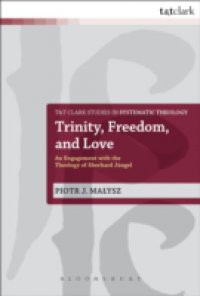By critically engaging Eberhard J'ngel's doctrine of theTrinity, this volume makes a broader, constructive contribution to contemporarytrinitarian thought.The argumentcenters on the question - posed by the inconsistencies uncovered in J'ngel'sdoctrine of God - of how one can assert both divine freedom and theinter-subjectivity of God's trinitarian self-determination. Can one maintain God's freedom in theinterest of divine spontaneity and creativity, while remaining committed to inter-subjectivevulnerability which the Cross entails as an event of divine love?Malysz suggests that a resolution to this problem lies ina logic of divine freedom, which, next to the trinitarian logic of love,constitutes a different and simultaneous mode of trinitarianrelationality. To develop this logic,Malysz draws on J'ngel's understanding of human freedom as rooted in the"elemental interruption" of the self-securing subject. Malysz thus not only brings J'ngel's view ofdivine freedom into correspondence with the anthropological effects that J'ngelascribes to it, but, above all, offers an imaginative, new way of closelyintegrating the doctrine of God and theological anthropology.

